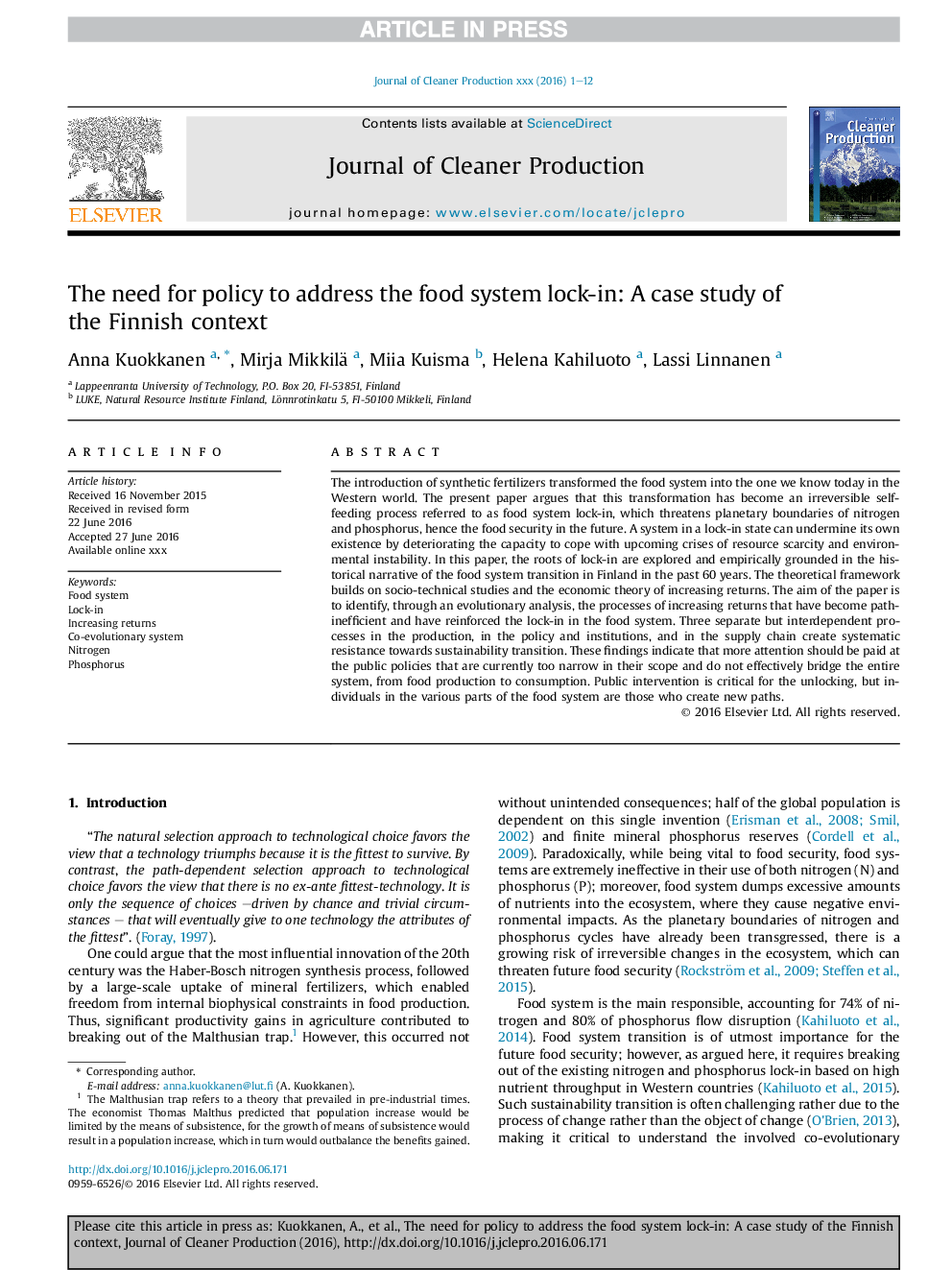| کد مقاله | کد نشریه | سال انتشار | مقاله انگلیسی | نسخه تمام متن |
|---|---|---|---|---|
| 5481565 | 1399335 | 2017 | 12 صفحه PDF | دانلود رایگان |
عنوان انگلیسی مقاله ISI
The need for policy to address the food system lock-in: A case study of the Finnish context
ترجمه فارسی عنوان
نیاز به سیاست برای رسیدگی به سیستم غذا قفل در: یک مطالعه مورد از زمینه فنلاند
دانلود مقاله + سفارش ترجمه
دانلود مقاله ISI انگلیسی
رایگان برای ایرانیان
کلمات کلیدی
سیستم غذا، قفل در افزایش بازدهی، سیستم همکاری تکاملی، نیتروژن، فسفر،
ترجمه چکیده
معرفی کودهای مصنوعی سیستم تغذیه را به آنچه ما امروز در دنیای غرب می دانیم تبدیل کردیم. در این مقاله استدلال می شود که این تغییر تبدیل شده است به یک فرآیند تغذیه نامنظم نامیده می شود به عنوان سیستم قفل مواد غذایی، که تهدید مرزهای سیاره ای از نیتروژن و فسفر، و از این رو امنیت غذایی در آینده است. یک سیستم در یک دولت قفل می تواند خود را با تضعیف ظرفیت برای مقابله با بحران های آینده از کمبود منابع و بی ثباتی زیست محیطی تضعیف کند. در این مقاله، ریشه های قفل در 60 سال گذشته در روایت تاریخی سیستم غذا در فنلاند مورد بررسی و تجربی قرار گرفته است. چارچوب نظری بر مطالعات اجتماعی و فنی و نظریه اقتصادی بازدهی افزایش مییابد. هدف مقاله، شناسایی، از طریق تجزیه و تحلیل تکاملی، فرآیندهای افزایش بازده است که به مسیر ناکارآمد تبدیل شده و قفل در سیستم غذا را تقویت کرده است. سه فرآیند جداگانه اما وابسته به تولید، در سیاست و نهاد ها و در زنجیره عرضه، مقاومت سیستماتیک را در برابر انتقال پایدار ایجاد می کنند. این یافته ها نشان می دهد که باید در سیاست های عمومی که در حال حاضر بیش از حد محدود هستند و به طور موثر از کل سیستم، از تولید مواد غذایی به مصرف مواد مخدر، بیشتر توجه شود، توجه شود. مداخله دولت برای باز کردن قفل حیاتی است، اما افراد در بخش های مختلف سیستم غذا کسانی هستند که راه های جدیدی را ایجاد می کنند.
موضوعات مرتبط
مهندسی و علوم پایه
مهندسی انرژی
انرژی های تجدید پذیر، توسعه پایدار و محیط زیست
چکیده انگلیسی
The introduction of synthetic fertilizers transformed the food system into the one we know today in the Western world. The present paper argues that this transformation has become an irreversible self-feeding process referred to as food system lock-in, which threatens planetary boundaries of nitrogen and phosphorus, hence the food security in the future. A system in a lock-in state can undermine its own existence by deteriorating the capacity to cope with upcoming crises of resource scarcity and environmental instability. In this paper, the roots of lock-in are explored and empirically grounded in the historical narrative of the food system transition in Finland in the past 60 years. The theoretical framework builds on socio-technical studies and the economic theory of increasing returns. The aim of the paper is to identify, through an evolutionary analysis, the processes of increasing returns that have become path-inefficient and have reinforced the lock-in in the food system. Three separate but interdependent processes in the production, in the policy and institutions, and in the supply chain create systematic resistance towards sustainability transition. These findings indicate that more attention should be paid at the public policies that are currently too narrow in their scope and do not effectively bridge the entire system, from food production to consumption. Public intervention is critical for the unlocking, but individuals in the various parts of the food system are those who create new paths.
ناشر
Database: Elsevier - ScienceDirect (ساینس دایرکت)
Journal: Journal of Cleaner Production - Volume 140, Part 2, 1 January 2017, Pages 933-944
Journal: Journal of Cleaner Production - Volume 140, Part 2, 1 January 2017, Pages 933-944
نویسندگان
Anna Kuokkanen, Mirja Mikkilä, Miia Kuisma, Helena Kahiluoto, Lassi Linnanen,
